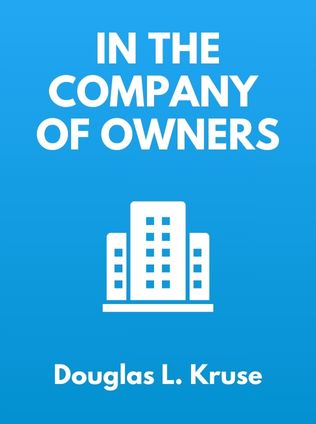
In the Company of Owners
The Truth about Stock Options (and Why Every Employee Should Have Them)
By Douglas L. Kruse,
Published 01/2003
In the Company of Owners: The Truth About Stock Options (And Why Every Employee Should Have Them)
About the Authors
Joseph Blasi is a sociologist who, alongside Douglas Kruse, an economist, serves as a professor at Rutgers University's School of Management and Labor Relations in Piscataway, New Jersey. Their combined expertise brings a unique blend of social and economic perspectives to the study of labor relations and employee ownership. Aaron Bernstein is a senior writer at Business Week magazine, based in Washington, D.C. His journalistic insights add a practical and real-world dimension to the theoretical framework provided by Blasi and Kruse.
Main Idea
"In the Company of Owners" delves into the concept of stock options and advocates for their broader distribution among employees, not just top executives. The authors argue that when employees own a stake in the company, it fosters a culture of partnership capitalism that can drive innovation, enhance performance, and ultimately benefit both the employees and shareholders. The book explores the history, advantages, and challenges of implementing stock options across various levels of the workforce.
Table of Contents
- The History of Partnership Capitalism
- How High-Tech Firms Do It
- New Options Every Year
- Shareholders Gain by Giving Up Ownership
- Stockholders Come Out Ahead
- How Corporate America Must Change
- Putting It All Together
- Barriers to Partnership Capitalism
The History of Partnership Capitalism
The concept of partnership capitalism, where employees share ownership and profits, has roots stretching back over a century. However, it was Silicon Valley's high-tech industry that truly revolutionized this idea by integrating cultural and financial incentives through stock options. The journey began with Nobel Laureate William Shockley, who left AT&T in 1956 to start Shockley Semiconductor Laboratories. Frustrated by AT&T's unwillingness to share royalties, Shockley inadvertently set the stage for a new corporate model.
Robert Noyce, one of Shockley's employees, led a group of dissatisfied colleagues to form Fairchild Semiconductor. Their insistence on a collaborative culture, devoid of traditional hierarchical constraints, paved the way for the success of Intel, founded by Noyce and Gordon Moore after leaving Fairchild. This model emphasized respect, nonhierarchical collaboration, and substantial ownership stakes for knowledge workers, setting a precedent for partnership capitalism.
"Valuable knowledge workers would become increasingly valuable and would need ownership for motivation." - Joseph Blasi
The partnership capitalism model reflects the broader structure of the Internet—a decentralized, collaborative network. High-tech companies, especially those involved in developing internet infrastructure, adopted these principles and saw significant growth and success. The model not only attracted top talent but also ensured that employees were invested in the company’s long-term success.
How High-Tech Firms Do It
The high-tech industry, particularly internet companies, adopted stock options as a norm, transforming employee engagement and company performance. The authors highlight the practices of the High Tech 100, the largest public companies deriving over half their sales from the internet. These companies demonstrated unprecedented levels of employee equity, with an average of 19% ownership at the end of 2000.
The distribution of stock options in high-tech firms contrasts sharply with traditional corporations. For instance, in the case of Portal, an ISP turned software developer, employees received options regularly, creating 350 millionaires even after the dot-com crash. This practice ensured that employees were invested in the company's success, fostering innovation and loyalty.
"The new corporate model gave intellectual and financial credit to workers whose creative talent contributed to the wealth of the company." - Douglas Kruse
High-tech firms like Cisco and Netscape exemplified how stock options could be used to motivate and retain employees. Cisco, for example, expanded its generous stock plan to new employees with each acquisition, integrating them into its collaborative culture. Despite stock price drops, Cisco continued to issue options, reinforcing employees’ commitment to the company.
Sign up for FREE and get access to 1,400+ books summaries.
You May Also Like
Rich Dad Poor Dad
What the Rich Teach Their Kids About Money - That the Poor and Middle Class Do Not!
By Robert T. KiyosakiFreakonomics
A Rogue Economist Explores the Hidden Side of Everything
By Steven D. Levitt and Stephen J. DubnerThe Lean Startup
How Today's Entrepreneurs Use Continuous Innovation to Create Radically Successful Businesses
By Eric RiesWho Moved My Cheese?
An Amazing Way to Deal with Change in Your Work and in Your Life
By Spencer Johnson, M.D.Factfulness
Ten Reasons We're Wrong About the World – and Why Things Are Better Than You Think
By Hans RoslingMake Your Bed
Little Things That Can Change Your Life...And Maybe the World
By William H. McRaven



















